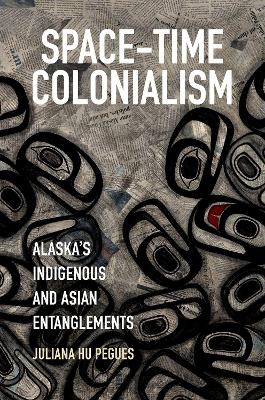
Space-Time Colonialism
Alaska's Indigenous and Asian Entanglements
Seiten
2021
The University of North Carolina Press (Verlag)
978-1-4696-5618-2 (ISBN)
The University of North Carolina Press (Verlag)
978-1-4696-5618-2 (ISBN)
Offering an intersectional approach to US empire, Indigenous dispossession, and labour exploitation, Space-Time Colonialism makes clear that Alaska is essential to understanding both American imperial expansion and the machinations of settler colonialism.
As the enduring "last frontier," Alaska proves an indispensable context for examining the form and function of American colonialism, particularly in the shift from western continental expansion to global empire. In this richly theorized work, Juliana Hu Pegues evaluates four key historical periods in U.S.-Alaskan history: the Alaskan purchase, the Gold Rush, the emergence of salmon canneries, and the World War II era. In each, Hu Pegues recognizes colonial and racial entanglements between Alaska Native peoples and Asian immigrants. In the midst of this complex interplay, the American colonial project advanced by differentially racializing and gendering Indigenous and Asian peoples, constructing Asian immigrants as "out of place" and Alaska Natives as "out of time." Counter to this space-time colonialism, Native and Asian peoples created alternate modes of meaning and belonging through their literature, photography, political organizing, and sociality.
Offering an intersectional approach to U.S. empire, Indigenous dispossession, and labor exploitation, Space-Time Colonialism makes clear that Alaska is essential to understanding both U.S. imperial expansion and the machinations of settler colonialism.
As the enduring "last frontier," Alaska proves an indispensable context for examining the form and function of American colonialism, particularly in the shift from western continental expansion to global empire. In this richly theorized work, Juliana Hu Pegues evaluates four key historical periods in U.S.-Alaskan history: the Alaskan purchase, the Gold Rush, the emergence of salmon canneries, and the World War II era. In each, Hu Pegues recognizes colonial and racial entanglements between Alaska Native peoples and Asian immigrants. In the midst of this complex interplay, the American colonial project advanced by differentially racializing and gendering Indigenous and Asian peoples, constructing Asian immigrants as "out of place" and Alaska Natives as "out of time." Counter to this space-time colonialism, Native and Asian peoples created alternate modes of meaning and belonging through their literature, photography, political organizing, and sociality.
Offering an intersectional approach to U.S. empire, Indigenous dispossession, and labor exploitation, Space-Time Colonialism makes clear that Alaska is essential to understanding both U.S. imperial expansion and the machinations of settler colonialism.
Juliana Hu Pegues is assistant professor of American Indian studies and Asian American studies at the University of Minnesota.
| Erscheinungsdatum | 06.05.2021 |
|---|---|
| Reihe/Serie | Critical Indigeneities |
| Zusatzinfo | 8 halftones, 1 map |
| Verlagsort | Chapel Hill |
| Sprache | englisch |
| Maße | 155 x 235 mm |
| Gewicht | 333 g |
| Themenwelt | Sozialwissenschaften ► Ethnologie |
| Sozialwissenschaften ► Soziologie ► Gender Studies | |
| ISBN-10 | 1-4696-5618-3 / 1469656183 |
| ISBN-13 | 978-1-4696-5618-2 / 9781469656182 |
| Zustand | Neuware |
| Haben Sie eine Frage zum Produkt? |
Mehr entdecken
aus dem Bereich
aus dem Bereich
wie sich das weibliche Gehirn jetzt verändert und Sie diese neue …
Buch | Hardcover (2023)
Mosaik (Verlag)
CHF 36,90
eine kritische Theorie in 99 Fragmenten
Buch | Softcover (2023)
Campus (Verlag)
CHF 55,95


